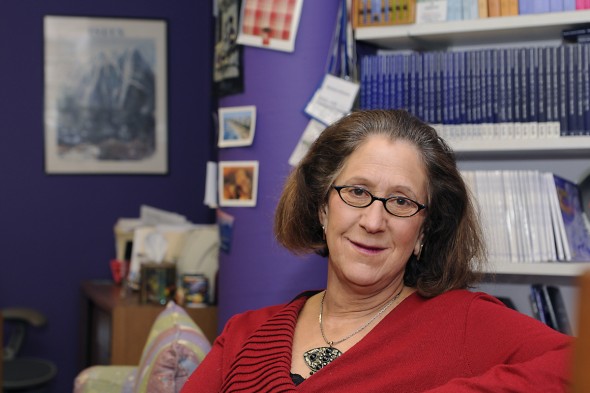Gender, culture and expectations

“We raise boys with guns and girls with dolls,” says Barbara Risman, head of sociology, who studies the theory of gender inequality. UIC Photo Services
A good name for Barbara Risman’s forthcoming book might be Everything You Always Wanted to Know About Gender (But Were Afraid to Ask).
“I’ve spent my whole career writing a theory of gender inequality,” said Risman, head of sociology.
“The book integrates many of my theoretical papers over the last two decades, with research projects.
“It’s a statement of the pace of change and the lack of change in how we think about feminist theory — an understanding of how gender inequality is produced and when it begins to lessen.”
The first time Risman published a theoretical argument was in her 1998 book Gender Vertigo: American Families in Transition.
“The new book pulls together the ideas I’ve been floating for a very long time, illustrated with new research,” she said.
Its working title is Gender as a Social Structure: Toward a Utopian Post-Gender Society. The book is due out in 2014.
“Every society has a gender structure,” Risman said. “It’s very different than thinking about how men and women are different — it has to do with what you expect from each other.”
Society creates gender inequality on three levels, she said.
The first is the individual level.
“We raise boys with guns and girls with dolls,” she said. “Girls are taught to be empathetic and nurturing; boys are taught to tough it out and be aggressive.”
The second level is interactional.
“It involves the expectations of other people,” Risman said. “Even when men and women are in the same position — parent, boss — people expect them to behave differently.
“An opinionated male boss is a strong leader, while a headstrong, opinionated woman is seen as a bitch.”
Women are expected to do emotional work and, at the same time, to be less committed to their work, Risman said.
“Expectations lead to reality sometimes,” she said. “Women think, ‘Maybe I am like that,’ because that’s what the cultural expectation is.”
The third level is institutional.
Expectations are built into schools and workplaces that in a hetero-nuclear family, there will be one person who earns a living and “another who takes care of everything else,” Risman said.
“This occurs even though we no longer live that way.”
One chapter in her new book is about how people ages 18 to 25 do or don’t feel constrained by gender.
“What’s really interesting is that people as young as 6 are totally rejecting the sex in which they were born,” she said.
Risman is heavily involved with the nonprofit Council on Contemporary Families. Once housed at UIC, it’s now based at the University of Miami. She was executive director from 2006-2012 and now serves on the board of directors.
“Its mission is to bring new research about families to public conversation,” she said. “I work with a lot of journalists and find the best scientists for them to interview.
“We also commission white papers when a new study comes out that should be covered.”
After Risman wrote an opinion piece for CNN.com, Huffington Post asked her to blog for the online publication.
She blogs about once a month, “when I see an issue that would be informed by sociological research and theory. It’s engaged scholarship, bringing it outside the ivory tower.
“I like to use my academic and research skills for the public good.”
Risman grew up in Lynn, Mass., an industrial town north of Boston.
“My grandparents were immigrants from Poland and Russia,” she said.
She earned a bachelor’s degree at Northwestern University and Ph.D. at the University of Washington in Seattle.
Before joining UIC, Risman spent two decades at North Carolina State University, where she founded the gender and women’s studies program.
UIC hired her in 2007 as head of the sociology department. She’s served five years in that capacity and agreed to three more.
Risman lives near campus in University Commons with her second husband, Randall Liss, head of a consulting firm on finance. She has a daughter, Leah Kane Risman, 27, a social worker in Sacramento, Calif.
Risman chairs a new neighborhood organization called Connecting 4 Communities.
“I blog weekly about something of interest — plays, jazz concerts, famous authors,” she said.
“There is not-very-good communication between the university and the people who live around it. I’m telling people what they should come to on campus.”
